| |
"I was going to the worst place in the world, and I didn't even know it yet. Weeks away and hundreds of miles up a river that snaked through the war like a main circuit cable and plugged straight into Kurtz." |
|
Captain Willard |
What more can I say about Apocalypse Now? Having already made my case in some detail for why it remains one of my very favourite films in my review of the US 2-disc DVD set Apocalypse Now: The Complete Dossier back in 2004 (can it really be that long...?), I find myself with little to add seven years later. Sure, there are things that I missed, some of which have become more evident with subsequent viewings or have been highlighted in the myriad of articles, books, commentaries and interviews that have appeared since the film's original release, but to further expand on what I've already written risks nullifying the purpose of many of the extra features included on this release. Thus if you're looking for a review of the film then check out my original DVD coverage here.
Seven years on I still far prefer the original 1979 version over the 2001 Redux expansion, a viewpoint shaped by more than the simple fact that I saw and fell in love with the original cut first, and again I've made my case for this preference in my DVD review. What I do applaud, as I did with The Complete Dossier release, is the option to watch either version at exactly the same quality – my infuriation remains at seeing Peckinpah's masterly Pat Garrett and Billy the Kid properly restored for DVD only in the 2005 recut, which was executed (and I choose that word deliberately) by people who had nothing whatsoever to do with the original production.
Much as I loved The Complete Dossier, I did note at the time that the absence of two key extras – the Kurtz compound destruction sequence and the documentary feature Hearts of Darkness: A Filmmaker's Apocalypse – meant that it didn't quite live up to the claim of being 'complete', something this 3-disc Blu-ray edition not only puts right, but actually builds on, with new extra features exclusive to this release. It also restores the original aspect ratio and presents the film on a home cinema format that was still two years away from commercial release back in 2004. This then, surely, is the absolute definitive release we have always dreamed of. Well, almost. It gets so much right – and I mean just about everything – that it seems odd that a couple of small soundtrack bungles have slipped into the extra features, but I'll get to that below. For now I'll assume that you either know or are at least aware of the film, and are only wondering one thing: how does it shape up on Blu-ray?
Apocalypse Now was always one of the most visually striking films of the 1970s, and its Technicolor restoration for the Redux release remains one of the most beautiful I've ever seen on a cinema screen. This was reflected in the picture quality on The Complete Dossier DVD, which was a noticeable improvement on previous DVD incarnations and was the sort of transfer that got you all excited about what could be achieved on the DVD format. And on a disc player that knows a thing or two about upscaling it still looks impressive, even on a 42" plasma screen. But with the arrival of Blu-ray we've come to expect a decent HD transfer to kick even the best DVD incarnation into second place, and I'm happy to report that the transfer here does just that. Everything that was great about the picture quality on The Complete Dossier is replicated or enhanced here, with the principal upgrade, unsurprisingly, being the level of picture detail, which easily surpasses that of the DVD, something particularly evident in metallic and material textures, the lettering on documents, and sequences busy with action and content. Cinematographer Vittorio Storaro's colour coding of scenes is vividly rendered, though in a trend that is proving increasingly popular on digital remasters, the tinting is noticeably stronger than it ever was in the cinema, and naturalistic colours such as flesh tones are rare. The contrast is punchy and the crucial black levels remain rock solid throughout, sometimes at the expense of shadow detail, but never in a way that feels detrimental to the image or intention. There are, however, some subtleties of tone in the darker scenes that require low room lighting if you're watching on a correctly balanced screen. It's also worth noting that the original projected ratio of 2.35:1 has been restored following Storaro's 2:1 (re-) framing for The Complete Dossier.
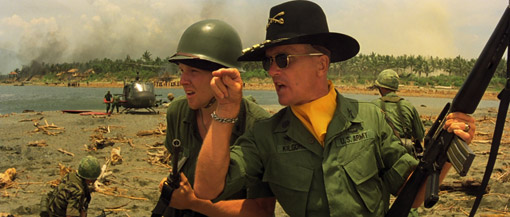
The Dolby 5.1 surround track on The Complete Dossier release was an impressive beast, with excellent use of the full surround stage and a strong bass response. And while the DTS-HD Master Audio surround track here does take the clarity and bass up a notch, the differences are not as obvious as you might expect, largely because the previous track left little room for improvement, and we are talking a soundtrack that is over thirty years old and that effectively marked the birth of 5.1 surround.
In a strange inconsistency, only English subtitles for the hearing impaired are provided for the main feature, while the extra features have subtitles in Spanish, German, Italian, Dutch, Cyrillic and Japanese, but not English.
Anyone who griped about having to change the discs midway on The Complete Dossier will be happy to hear that both versions of the film are contained on a single disc here.
A large number of the extra features here have been ported over from The Complete Dossier, and rather than refer repeatedly to my original review, I've copied or adapted some of my comments from that article. It's worth noting that this is the first time most of the extras here have appeared on a UK release of the film. The resolution of each of the extras is listed after the running time.
Disc 1
Commentary
This is the same Francis Coppola commentary track that appeared on The Complete Dossier, but given the sheer volume of information contained within, it's a logical and welcome inclusion. Coppola proves a captivating storyteller, and although his comments are largely screen specific, he often uses them as a springboard for more generalised stories about the production. Areas covered include the chance discovery that gave us one of the most memorable opening scenes in film history, the dream that helped Martin Sheen get inside his character, how Harrison Ford's tiredness and nervousness were turned to the film's advantage, the original casting of Harvey Keitel as Willard, the influence of electronic music composer Tomika on the score, Jerry Greenberg's editing of the helicopter attack sequence, shooting air combat scenes in real helicopters, the footage restored for the Redux cut, the desire to give the film a sensurround soundtrack, and a lorryload more. The only disadvantage of such a comprehensive commentary is that you're going to hear many of the stories repeated elsewhere, albeit from sometimes alternative angles.
Disc 2
An interview with John Milius (49:45 1080p)
The first of two conversations, both new to this release and both in HD, in which Coppola chats with one of his key collaborators on the film. The first is with original writer John Milius, whom Coppola goes to great pains to identify as the originator of the project and credit with writing some of its most iconic dialogue. Very effectively prompted by his colleague, who occasionally expands on the responses with his own recollections, Milius takes us on an entertaining trip through the development of the project and discusses, amongst other things, how he came up with the title, the input of the original director George Lucas, the development of the story and the incorporation of his extensive research, writing to the tunes of Wagner and The Doors, his admiration for the actors and hanging out with first choice leading man Steve McQueen, and his views on the restoration of previously cut scenes. He also reveals that in his student days he never dreamed he would ever become a director, but tellingly adds, "I didn't realise until I got into Hollywood how bad a lot of directors were."
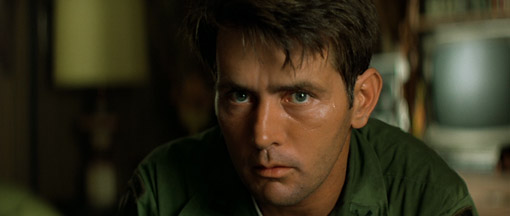
A Conversation with Martin Sheen and Francis Ford Coppola (59:26 1080p)
Filmed in the very studio in which Sheen recorded his memorable voice over, this proves a fine companion piece to the Milius conversation, with Coppola once again proving a good feed man, drawing (and expanding on) a number of informative and entertaining stories from his lead actor. Sheen talks candidly about his health issues, his heart attack, the emotional release of the hotel room scene, the decision not to go with Harvey Keitel ("He was a real marine!"), his initial take on the character of Willard, working with Robert Duvall, how intimidated the entire cast were by Coppola (whom he compares to Elia Kazan), meeting and working with Brando, and a good deal more. The two share plenty of stories about famed rock impresario Bill Graham (who played the MC at the Playboy show), and Sheen recalls with amusement that the five actors playing the PBR crew had not done a single day's military service between them.
Fred Roos: Casting Apocalypse (11:43 1080p)
Coppola's regular casting director, who also functioned as co-producer on the film, recalls the casting process, which included actors who were ultimately dropped or bowed out like Steve McQueen and Nick Nolte. This is intercut with some fascinating footage of the run-though auditions, where Albert Brooks (who plays Chief) out-performs everyone in the room. Roos also claims that they didn't know Larry Fishburne was only fourteen years old until they reached the Philippines, which differs slightly with Coppola's take.
The Mercury Theatre on the Air: Hearts of Darkness – November 6, 1938 (36:34 1080i)
The complete recording of the Mercury Theatre broadcast of Conrad's Heart of Darkness, extracts of which pepper the Hearts of Darkness documentary on Disc 3. The sound quality varies and there is some serious damage and spectacular crackle, but this still makes for fascinating listening, with Orson Welles narrating and providing several of the character voices. The only down side is that a single image remains on screen for the entire running time, long enough to prompt a bit of a screen burn if you have a plasma TV.
The Hollow Men (16:55 480p)
A complete reading of T.S. Elliot's The Hollow Men by Marlon Brando as Kurtz, broken up and intercut with behind-the scenes footage of the Kurtz compound sequences shot by Eleanor Coppola. It's a hypnotic, almost dream-like piece, directed by Francis Coppola.
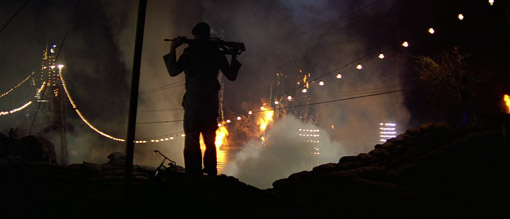
Monkey Sampan "Deleted Scene" (2:51 480p)
A downright surrealistic deleted scene with a nightmare twist that is worth being surprised by. Is in far better condition than the additional scenes below.
Additional Scenes (26:08 total 480p)
12 additional scenes gleaned from what looks like timecoded VHS, all of which are interesting and provide an intriguing glimpse of how things might have been. Colby (played by Scott Glenn and seen only briefly in the film) gets some dialogue and executes Dennis Hopper's photojournalist, Lance nearly falls victim to a booby trap, and some interesting extensions are provided to familiar scenes. One sequence I am seriously glad was chopped has Willard cheerily introduced to the boat crew in a rather cheesy superimposition.
Kurtz Compound Destruction with Credits (6:02 480p)
An inaccurately titled extra that although features the destruction of the Kurtz compound, a sequence that ran underneath the original end credits on the 35mm print (see my review of the DVD for more on this), is actually presented not with those credits but without them. There is also a commentary by director Coppola, who explains why the footage was shot and how it was misread and was led to rumours that the film had two endings (I distinctly remember this), prompting him to recall the prints and replace the sequence with the simple white text on black that you'll find on the film now. This extra was not included on The Complete Dossier, but was on the previous UK and US DVD release.
The Birth of 5.1 Sound (5:51 480p)
An educational featurette that looks at the film's sound design and its pioneering use of what we now know as 5.1 surround. It includes behind-the-scenes footage of post-production work, and interviews with Walter Murch, Francis Coppola and Ioan Allen of Dolby Labs, who provides a very clear history of the development of cinema surround sound (aided by some simple but very effective graphics), and berates home cinema users for having their surrounds and subwoofer turned up far too high...goddammit! As with all of the extras on disc 2, the soundtrack is stereo rather than 5.1, which...oh, I'll deal with that next.
Ghost Helicopter Flyover (3:55 480p)
A featurette covering the sound mix for that opening sequence that so dazzled us back in 1979, which also includes a neat graphical representation of the speaker usage as you listen to the mix. The only thing is, the featurette has been encoded in DTS 2.0 stereo instead of the 5.1 track that was clearly intended and that was present on the version on The Complete Dossier DVD. As a result, you can't actually hear the effect as it's demonstrated. In the immortal words of Richie Cusack from A History of Violence, how do you fuck that up?
Apocalypse Now: The Synthesizer Soundtrack by Bob Moog (1080p)
A detailed textual essay on the evolution of the film's distinctive electronic music track.
A Million Feet of Film: The Editing of Apocalypse Now (17:55 480p)
A concise and informative look at the editing of the film, and includes interviews with all the main players and some more footage of the post-production work, including of Sheen recording the voice-over and brief discussions with scriptwriter John Milius.
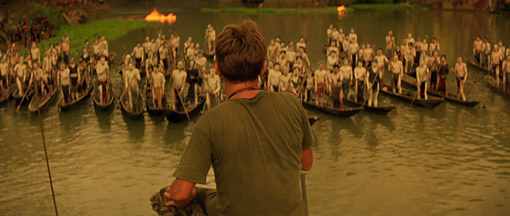
The Music of Apocalypse Now (14:44 480p)
A wonderful examination of the development of the electronic score, a constant eye-opener that enhances further your appreciation of just how much work and passion went into this film. It includes more terrific archive footage, but once again the excellent 5.1 soundtrack of the version on The Complete Dossier has been narrowed down to a DTS stereo track. Why?
Heard Any Good Movies Lately? The Sound Design of Apocalypse Now (15:17 480p)
A look at the film's ground-breaking sound design that again mixes interviews with archive footage to compelling effect. The footage of recording the sound effects for the tracer attack on the boat is brief but priceless. Once again the 5.1 track from The Complete Dossier has been reduced to DTS 2.0 stereo. This is a feature about SURROUND SOUND, guys...
The Final Mix (3:07 480p)
A short but interesting trip back to the nine month long sound mixing process.
Apocalypse Then and Now (3:42 480p)
A brief look back at the Cannes screening, and Walter Murch talks about re-editing the French plantation sequence for Redux.
2001 Cannes Film Festival: Francis Ford Coppola (38:34 1080i)
Roger Ebert interviews Francis Coppola – sometimes rather loudly even though they're sitting only a few feet apart – during the 2001 Cannes festival at which Apocalypse Now: Redux was screened. Coppola recalls the first Cannes screening of the original version and discusses the multiple ending myth, the French plantation sequence, working with the actors, and staging the helicopter attack, which Ebert cites as one of the greatest film sequences ever made. Much of this has also been covered on the other extras, but Coppola is particularly entertaining here. He also praises DVD as "the filmmaker's friend" and reveals that Redux was originally intended as a DVD only release. This is filmed from a distance on a slightly unstable surface, so the picture is prone to wobble when people walk by the camera.
PBR Streetgang (4:07 480p)
A collection of retrospective interviews with the actors who played the boat crew that includes some pre-production read-through footage.
The Color Palette of Apocalypse Now (4:05 480p)
A look at the creation of the Technicolor print created for the Redux release.
Disc 3
Hearts of Darkness: A Filmmaker's Apocalypse (95:59 1080p)
Making-of documentaries are a variable breed, but most tend to fall into one of two categories: a ramshackle collection of behind-the-scenes footage shot by a crew member on mini-DV, or an Electronic Press Kit comprised of the same behind-the-scenes material intercut with upbeat interviews with the cast and crew. Probably my favourite from the former group is the one you'll find on Tartan's Vengeance Trilogy box set for Oldboy, which follows the entire production from start to finish and runs for a staggering three-and-a-half hours, about ninety minutes longer than the main feature, but unfolds in a manner that almost makes us feel part of the production, which for fans of the film is an absolute treat.
But sitting comfortably at the peak of the behind-the-scenes mountain are a sprinkling of properly structured, feature-length works that prove almost as gripping as the films they document, the best of which are usually given a serious dramatic leg-up by the over-ambition of visionary filmmakers. It's precisely this that gave rise to three of the very best documentary features about the trials of the filmmaking process: Burden of Dreams, Les Blank's record of the making of Werner Herzog's Fitzcarraldo; Lost in la Mancha, Keith Fulton and Louis Pepe's chronicle of the disastrous collapse of Terry Gilliam's The Man Who Shot Don Quixote; and Hearts of Darkness: A Filmmaker's Apocalypse, which documents in sometimes intimate detail the production of – you've guessed it – Apocalypse Now.
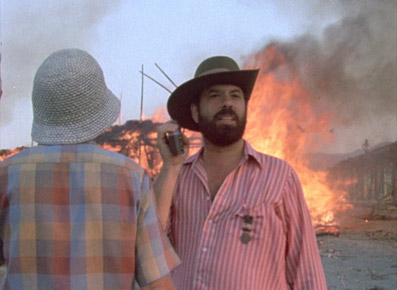
Hearts of Darkness was assembled by enthusiastic young filmmakers Fax Bahr and George Hickenlooper from a mixture of 16mm footage shot on location by Coppola's wife Eleanor, audio recordings of private conversations between her and her husband, newly filmed interviews with cast and crew members, and a voice-over read by Eleanor and taken from her published diary of the shoot. The resulting film provides a fascinating insight into this ambitious but sometimes troubled production, Eleanor's relationship and constant proximity to the director allowing her to capture moments that no outsider would have had a chance of even witnessing, some of which – Coppola's angry proclamation following Sheen's heart attack that "if Marty dies, I want to hear everything is OK until I say Marty is dead!" or his desperate plea to Eleanor, "This film is a twenty million dollar disaster! Why won't anyone believe me? I'm thinking of shooting myself!" – have passed into legend.
If you come to Hearts of Darkness after the other extras in this set, then it will likely prove less surprising than it did on its first appearance in 1991, but even if you do there's a disarming freshness to the structure and content. After all, the production of Apocalypse Now provides all of the twists and surprises of a great drama and has at its centre a colourful lead player in Coppola, whose unbridled energy, willingness to improvise and moments of chronic self-doubt and vulnerability cast him as a benevolent Svengali, a creative and potentially explosive sun around which the assembled talent orbit and is encouraged to brightly shine. The retrospective interviews are tellingly employed, with Sam Bottoms openly discussing his on-location drug use and John Milius providing and engaging recollection of how, in the course of a single meeting at the height of the film's problems, Coppola convinced him that the film he had been assured was heading for disaster was actually destined for greatness. The story concludes in a disappointingly hurried and incomplete manner, with a brief peek at the Cannes festival that provides the film's opening speech, but Coppola himself provides an upbeat and artistically spot-on coda about the next generation of as-yet undiscovered filmmakers. It's a great ending for a fascinating insider's view of a production whose like we are, with the dawn of the CG age, unlikely to ever see again.
But wait, there's more. Imported from Paramount's previous stand-alone US DVD release is a Commentary by Francis and Eleanor Coppola, and like Coppola's main feature commentary this proves a very worthwhile and informative addition. After groaning at the Cannes speech that opens the film and suggesting that a better title would be "Watch Francis Suffer," the director reveals that his prime reason for doing the commentary was to clarify aspects of the documentary that he believes are inaccurate or misleading. Fortunately his contribution proves a lot more than that, though it's Eleanor – whose viewpoint and observations go largely unrepresented in the other extras – who proves the most revealing commentator, from her admission that she knew nothing about camerawork when starting the film to her recollections of an always immaculately dressed Italian crew arranging for their own food and coffee to be shipped in with the processed film. She also provides some useful background to the production of this documentary, her quick development as a reportage camerawoman neatly illustrated when her husband reveals that when he admitted to her during the shoot how frightened he was, instead of offering support she grabbed the camera and asked him to repeat what he had just said. It ends with a lament from Francis for the death of Bergman and Antonioni and the future of cinema.
John Milius Script Excerpt with Francis Ford Coppola Notes (1080p)
The sort of extra that 70-inch HD screens were made for, this extra consists of a manually advanced slideshow of 60 pages from John Milius's original script, plastered with feedback notes from Coppola. You'll need to be sitting close to a large TV screen to be able to read the type – which thanks to the definition of Blu-ray, you can – but Coppola's notes are generally clear and provide a fascinating insight into how characters, specific scenes and the thrust of the narrative were shaped.
Storyboard Collection (11:14 1080p)
A rolling gallery of storyboards from the film, nicely drawn and a decent size, plus some shot information sheets containing a mixture of storyboard graphics and typed text.
Photo Archive (1080p)
Two rolling photograph collections, Unit Photography (1:37) and the more artistically interesting but brief Mary Ellen Mark Photography (0:30).
Marketing Archive (1080p)
A catch-all heading for the 1979 Theatrical Trailer (3:56) and 4 1979 Radio Spots (2:05), a reproduction of the 1979 programme (the UK version of which I once owned and was stolen from me by one of my fellow film students – boy do I hold a grudge...), Lobby Cards and Press Kit Photos (3:40), and a Poster Gallery (0:27).
It's so frustrating. I should be sitting here telling you that this is, without question, the definitive home video release of Apocalypse Now, and in just about every important way it is. The transfer is lovely, the soundtrack excellent, just about every extra feature from previous DVD releases have been included and supplemented by some fine new interview material, as has the celebrated, feature-length documentary on the film's production complete with the commentary from its previous US stand-alone release. And most of this is appearing UK home video for the very first time. It's a glorious thing, assembled with a clear determination to include every possible related extra feature. So how in hell is it that the imported featurettes that deal with the film's surround soundtrack have had their own 5.1 tracks reduced to two-channel stereo? It's a small thing, yes, but given the film's pioneering use of surround sound and the fact that one of the featurettes actually demonstrates the surround track at work – or at least did on the DVD on which it originally appeared – there's an inescapable sense that no-one involved in the production of this set properly checked the extra features they were compiling. For everything else here, this still comes highly recommended, and there is enough new material to make it a worthwhile upgrade even if you have The Complete Dossier, but I'm still just a little miffed about that sound issue.
|